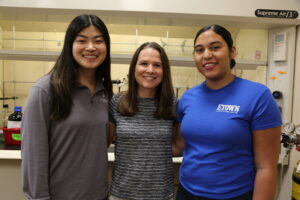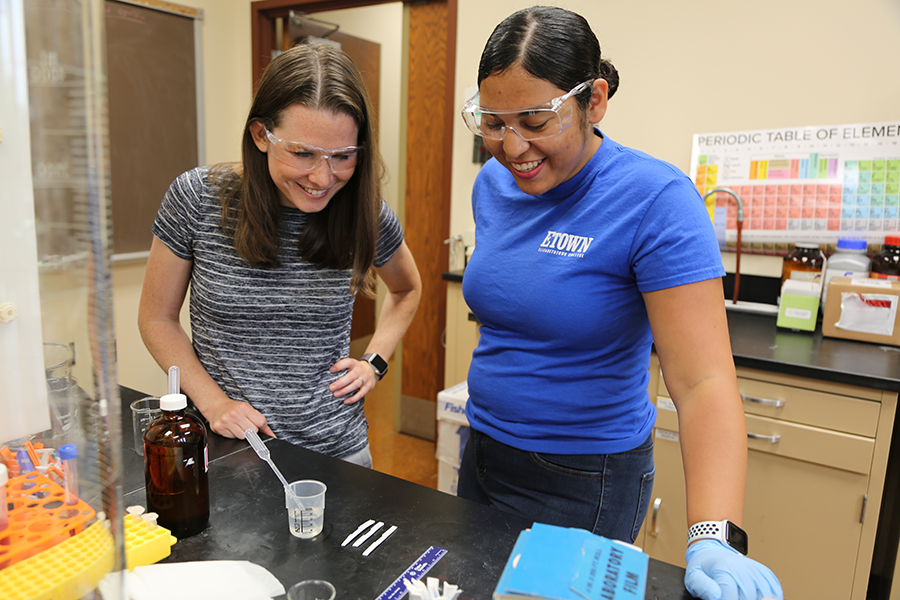A pair of Elizabethtown College students are improving tests for lead in accordance with the standard set by the Environmental Protection Agency (EPA).
Kyla DeWittie ’24 is focusing on making adjustments to the test line, which changes color in the presence of lead, and Yudeliz Sanchez ’25 is working on the control line, which changes color to indicate that water has passed through the sample and that the lead test has been successful.
This independent student research is conducted in collaboration with an Etown faculty mentor and is a continuation of three years of Summer Creative Arts and Research Program (SCARP) projects.
Title of research
Optimization of Simple and Inexpensive Paper-Based Assay for Lead
Student Researchers
Kyla DeWittie ’24 (Biochemistry and Molecular Biology major)
Yudeliz Sanchez ’25 (Biochemistry and Molecular Biology major)
Faculty Mentor
Lauren Toote, Assistant Professor of Chemistry
What are you researching?
Kyla: The goal of this project is to develop a quick, inexpensive, and sensitive paper-based test to detect low levels of lead in drinking water. Lead has detrimental effects on human health, so the levels of lead in water are regulated. According to the EPA, the concentration of lead that can safely exist in water is in the low parts per billion range. To help people detect these low levels of lead in their drinking water, our lab is working on synthesizing polymer nanoparticles that are incorporated onto a lateral flow assay that will change color if lead is present in the water sample.
Yudeliz: I am currently optimizing the control line on the paper-based assay. The control line is necessary for both a positive and negative result to indicate the test is working.
Why did you choose this topic?
Kyla: I love the application of this project. Being able to work on developing a physical test that could potentially be utilized worldwide and help keep people safe is really exciting and inspiring.
Yudeliz: I chose this topic because I found the research to be interesting and important since many older homes have a water supply system containing lead pipes. This would help people make sure the water they use is lead-free.
What is the most interesting aspect of this research?
Kyla: The design of our test is really interesting. By using a paper-based lateral flow assay design, anyone can run the test. No training or expensive instrumentation are required like for the other existing water testing methods. Our test will be inexpensive, easy to use, and yield quick results which will help increase the impact our test has.
Yudeliz: I think the most interesting aspect of this research is the use of nanoparticles and how the test itself works.
How has your faculty mentor helped you?
Kyla: Dr. Toote is an amazing mentor! I have learned so much from her. She has helped me grow so much as a scientist and person and continues to do so every day. Her support and guidance are unmatched.
Yudeliz: Dr. Toote has helped teach me some new lab skills and techniques, such as biotinylation. She has also been helpful in bouncing back ideas on ways we can improve our project and the next steps we should take.
Hear from the faculty mentor – Lauren Toote
“Working with Kyla and Deli has been very rewarding,” Toote said. “Kyla did SCARP with me last summer and it’s been great to see how much she has grown as a scientist since then. Deli has been really good at thinking through her project and coming up with new ideas. It’s been great to see her confidence develop.”

